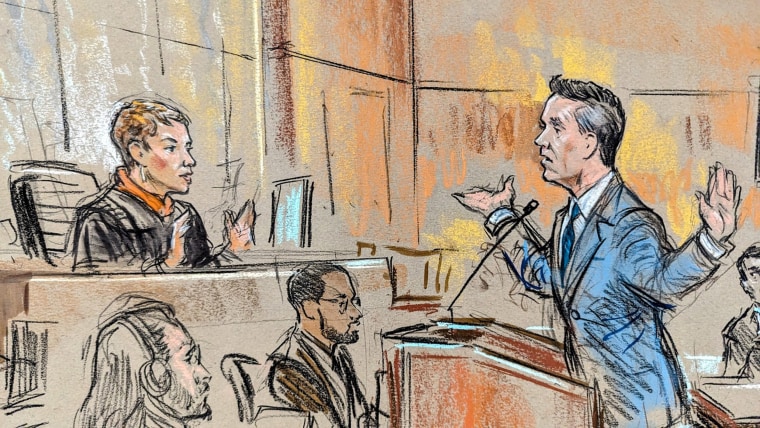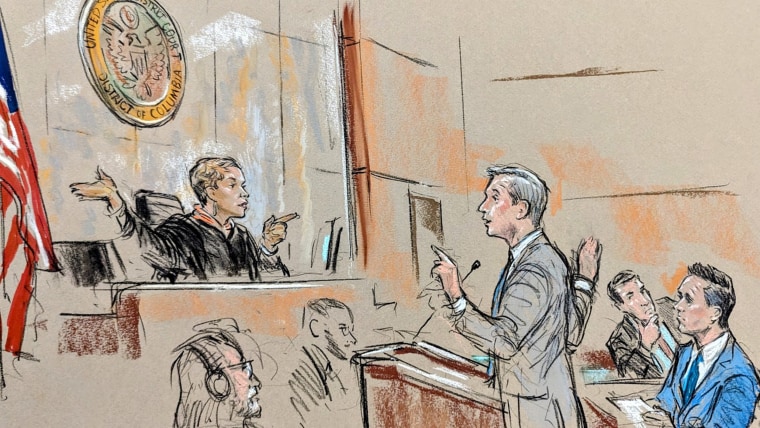U.S. District Judge Tanya Chutkan, a former public defender with a lively and amiable courtroom presence, presided over her first hearing in the federal 2020 election interference case against Donald Trump on Friday. And just a few hours later, she issued a protective order governing the use of discovery provided to the former president and his counsel that largely, albeit not entirely, hews to special counsel Jack Smith’s proposed version.
The order Chutkan entered prohibits Trump from disclosing or discussing with anyone other than his lawyers and others employed in his legal defense any “sensitive materials,” including, but not limited to, grand jury and other witness interview transcripts; “personally identifiable information,” such as home addresses; and even records provided by other government entities, like Secret Service emails.
This particular order tries to anticipate what might unfold when Trump is the defendant in question.
The order also requires that Trump’s counsel maintain custody and control of those materials, as opposed to giving the former president any copies of his own; ensure he has no ability to make his own copies if he reviews those materials privately; and even guarantee that any notes Trump takes of the materials do not include private, personal details about any person.
While protective orders are standard in criminal cases, especially ones where the risk of witness intimidation and potential jury pool tampering are high, this particular order tries to anticipate what might unfold when Trump is the defendant in question. But I’m less concerned with the text of the order itself than I am with the hearing I observed, which was one for the ages.
Here are some of my observations — and lingering questions — after watching it all go down on Friday.
Is Trump hemorrhaging money?
Chutkan announced at the hearing’s outset that she would use the Trump team’s edits to the government’s proposed protective order as a starting point, and the arguments (and rulings) mostly proceeded in order of the provisions by page. Unsurprisingly, the scope of the protective order (e.g., would it apply to all discovery materials or a subset thereof?) and how the order should define “sensitive materials” consumed the most argument time.
But the question of who can have access to the sensitive materials, while resolved on Friday in the government’s favor, is an issue that’s likely to recur. Trump lawyer John Lauro urged Chutkan to allow Trump’s counsel of record to share access with anyone assisting in his defense, whether or not those individuals are paid or even retained by Trump or his counsel. And in so doing, Lauro insinuated his client’s lean legal team was playing David to the special counsel’s 60-lawyer Goliath. His side’s preparing for trial would necessitate relying on “volunteer” legal help, Lauro said.

But why? Trump is, after all, a self-proclaimed billionaire — and one who, assuming Federal Election Commission filings reflect all or most legal spending by and for Trump, has already spent tens of millions in 2023 alone on lawyers for himself, his employees or his allies. Those filings suggest expense has not been a factor.
But with Lauro raising the specter of a volunteer legal army, is Team Trump now conceding that his PAC’s once-overflowing coffers have been overwhelmed by the nature and number of criminal cases in which Trump has been charged? Indeed, The New York Times reported Friday that the political committees Trump controls, as well as the super PAC that makes expenditures on his behalf, have spent significantly more than they’ve earned in the first six months of 2023.
Smith’s team has “hundreds” of recordings of witness interviews.
Anyone familiar with Trump’s history of online harassment could have expected that Chutkan would agree to treat the government’s interviews of witnesses both within and outside the grand jury as sensitive. But prosecutor Thomas Windom also revealed that in conducting interviews outside the grand jury at the special counsel’s office or in other jurisdictions, the government’s practice has been to make audio recordings of each such meeting — and then he dropped a further bomb: There are literally hundreds of them.
If the government reduces those interviews to FBI memos or even transcripts, why is it significant that there are also recordings? Well, ask yourself whether Cassidy Hutchinson’s testimony to the House Jan. 6 committee last summer would have had the same impact if not videotaped. Or alternatively, do you recall watching clips of Trump’s deposition in the E. Jean Carroll case earlier this year and how his mistaking Carroll for his ex-wife Marla Maples was all the more damning on tape than it was in writing, even though that transcript had been released months earlier?
Voice, tone and timing are all aspects of what makes a witness compelling — and credible. And here, even though it does not appear the special counsel’s office has video of these meetings, the audio itself could be blockbuster evidence, both in and out of court, if and when it becomes public.
Think also about who is likely to be on those recordings. The investigation is rife with witnesses who, as far as we know, have not testified before a grand jury, but have met informally with the special counsel’s investigators. Those folks range from lawyer Rudy Giuliani to Georgia Secretary of State Brad Raffensperger. That there are recordings of those meetings — and ones about to be in Trump’s hands — is a big deal, and might have been a big problem had the protective order not prevented their discussion or disclosure by Trump.
Expect Team Trump to cite discovery volume in their own trial date request.
We also learned at Friday’s hearing that the special counsel’s first discovery production will contain 11.6 million pages in “load ready” format (meaning they have been formatted to be viewed on specialized, discovery software for attorney review) — and that’s not all.
The special counsel will also turn over a hard drive consisting of other evidence, the volume of which Windom represented that he could not estimate. But that evidence will include data obtained through what are known as “2703(d) orders,” referring to a provision of the Stored Communications Act. In other words, the data Trump’s team will receive also includes what the government obtained through court-ordered search warrants to major tech companies like Twitter, which received such an order for data and information relating to Trump’s own Twitter account months ago.
Yes, that’s a lot of discovery, especially for a one-defendant case. On the other hand, as Windom conceded in court, there will likely be significant amounts of publicly available materials (including those Jan. 6 committee transcripts and discovery that are already in the public record), duplicative materials (e.g., emails obtained from multiple parties to a conversation or thread), and material Trump himself already likely has or has access to because it came from his PAC or campaign.

Still, notwithstanding what can be skimmed off the top, so to speak, the volume is still massive — and with Trump’s team hinting at resource constraints, you can expect his lawyers to harness the sheer quantity of discovery as the most persuasive reason a January 2024 trial is impracticable, if not unjust.
Chutkan is equal parts creative and in control.
The federal bench takes all kinds: Some judges are taciturn. Some are comic. Some allow oral arguments for hours. Others decide motions purely on the papers.
And judging by Friday's hearing, Chutkan is a person comfortable in her own skin; firm but not loud or strident; meticulously prepared, but not inflexible; and equal parts creative and in control.
For example, she not only repeatedly told the parties that electoral politics would not influence her decision-making, but she also often ignored Lauro’s attempted injection of Trump talking points into oral argument, choosing instead to press him on inconsistencies between his client’s positions in her case versus those taken in the classified documents case pending before Judge Aileen Cannon in Florida. Chutkan also invoked her own history as a criminal defense lawyer, both to establish some goodwill with Lauro and also to remind him and others, sometimes with deft humor, that she is well aware of Trump’s rights.
Nonetheless, Chutkan waited until the end of the proceeding to drop her ultimate truth bomb: that her greatest concern, and one that outweighs Trump’s speech rights, is the integrity of the proceedings and that, in keeping with federal precedent, she would not tolerate any carnival-like atmosphere in her courtroom or around the case.
Instead, she urged that the parties and their counsel alike “take special care” to avoid the kind of rhetoric that even if not violative of the protective order, would nonetheless threaten the fairness of the trial and/or the safety and security of witnesses. If they could not do that, she explained, she would have no choice but to expedite the trial to avoid harming witnesses or tainting the jury pool.
Trump might not care whether she sanctions him or modifies his conditions of release. In fact, in some ways, he might be craving exactly that. But the threat of a trial on the government’s timeline or something close to it? That just might be the kind of stick a horse named Trump needs.
